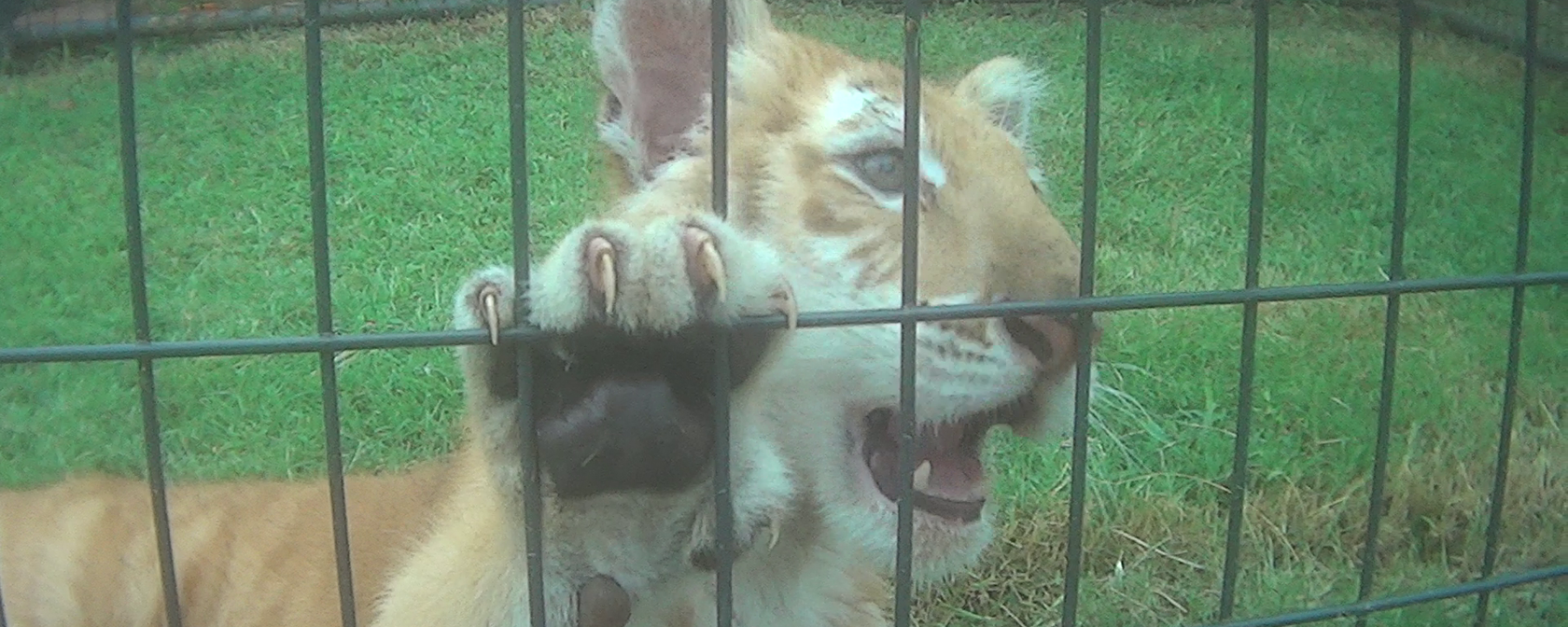By Sara Amundson and Kitty Block
A bill that would prohibit public contact with big cats like tigers, lions and leopards and ban keeping these animals as pets has been reintroduced in the U.S. Senate.
The Big Cat Public Safety Act, S. 1210, would end the suffering of animals like Elsa, a tiger cub kept as a “pet” and found abandoned outdoors during Texas’s historic winter storms earlier this year. It would also put a stop to the horrors big cat cubs, especially tiger cubs, endure at the hands of exhibitors and roadside zoo owners like Joe Exotic and Jeff Lowe, seen on Netflix’s “Tiger King.” These facilities offer the cubs to paying members of the public to pet, feed and pose for photos with—a practice called “cub petting.”
Stopping these practices is one of our top legislative priorities. The Big Cat Public Safety Act passed the House in the last Congress with nearly two-thirds of members supporting it. Unfortunately, the session ended before it could be taken up by the Senate.
The Senate version of the bill introduced today reflects the growing support this bill enjoys in Congress: it is sponsored by the bill’s longtime champion Sen. Richard Blumenthal, D-Conn., and, for the first time, Sen. Susan Collins, R-Maine, has signed on as the co-lead sponsor. They are joined by Sens. Tom Carper, D-Del., and Richard Burr, R-N.C.
The House version of the bill was reintroduced in January as H.R. 263 by Reps. Mike Quigley, D-Ill., and Brian Fitzpatrick, R-Penn.
More than 70 animal welfare organizations, professionally operated zoos and animal sanctuaries, and law enforcement organizations and officials have also endorsed the bill. Most states have passed laws banning keeping dangerous animals as pets and one more state, Nevada, is in the process of passing a similar law.
Most Americans support such a law as well. Our undercover investigations have laid bare the cruelty people like Joe Exotic commit against the animals; he is now serving 20 years in prison for, among other crimes, killing five tigers in his care. In the Netflix series, he is seen snatching tiger cubs away from their mothers moments after birth. As our own investigation of Joe Exotic’s roadside zoo and similar operations have revealed, to prepare the animals for public contact they are fed irregularly, constantly woken from their sleep, and physically abused when they resist.
At three to four months of age, when they are too big to be used for public contact, they are sent to substandard facilities or into the pet trade. More tiger cubs are bred to replace them, continuing this cruel cycle. Conservationists have long feared that tigers discarded from the cub-petting industry may also feed the illegal market for animal parts used in some forms of traditional medicine, and the poaching of big cats in the wild.
The pandemic has provided another good reason to ban cub petting. The coronavirus has been found in tigers, lions, cougars and snow leopards in captivity, leading the U.S. Department of Agriculture to issue a rare advisory to big cat exhibitors to discontinue hands-on encounters with wild cats in the interests of public safety and animal welfare. (In guidance released last Thursday, the USDA also advises against public contact with nonhuman primates and animals in the Mustelidae family, which includes mink, ferrets and otters.)
Clearly, we need the Big Cat Public Safety Act now more than ever. This is common sense legislation and there should be no debate over ending the suffering of big cats at the hands of those who mistreat them. Please join us in urging your U.S. Senators and Representative to cosponsor and push for passage of this bill without delay.
Act now and tell your legislators to support the Big Cat Public Safety Act >>
Kitty Block is President and CEO of the Humane Society of the United States.




